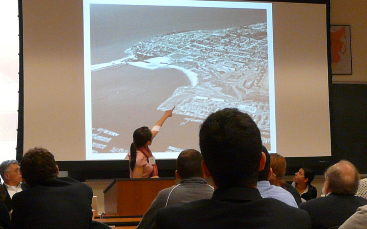
Environmental History at Yale hosted a one-day conference on “Social Conflict and Environmental Change in Comparative and Historical Perspective” on April 17. The conference engaged 55 graduate students and faculty from 20 northeastern colleges and universities in an examination of the intersection of social and environmental history.
“Environmental conflict is going to be the fundamental source of conflict in the future,” said University of Kansas Professor Donald Worster, the Strachan Donnelley Visiting Environmental Scholar and the conference’s keynote speaker. The issue “really needs the full engagement of people in the field of history and humanities,” said Worster. Helen Curry, a doctoral student in Yale’s History of Science and Medicine program and a conference organizer, echoed the importance of the symposium topic, adding, “Having a conference centered on the theme of environmental conflict not only enables those in the field to explore this subject together, but also hopefully draws the attention of other academics to critical social and environmental issues.”
Sara Fingal, Doctoral Student at Brown University, discusses conflicts over the development of Cabrillo Beach in Los Angeles, California.
Presentations by doctoral students from eight universities explored the conference’s three central themes. Speakers examined political conflicts associated with the extraction and exploitation of biological resources and tensions surrounding technological expertise in natural resource development. “Both the quality and the variety of the papers make me feel extremely encouraged about the state of the field” said Harriet Ritvo, MIT Professor of History and President of the American Society for Environmental History. “There’s a lot of good work in the pipeline and we should all be very happy, at least about the field, if not about the environment.”
The day concluded with a faculty panel featuring Karl Jacoby (Brown), Emmanuel Kreike (Princeton), and Harriet Ritvo (MIT). Faculty from Yale, Cornell, Wesleyan, and Boston University also chaired and commented on individual panels. “The conference caps a year of stepped-up activity on campus focused on environmental history,” said Paul Sabin, assistant professor of environmental history at Yale. “We look forward to continuing to build on growing student and faculty interest to continue our programming in the coming year.”
